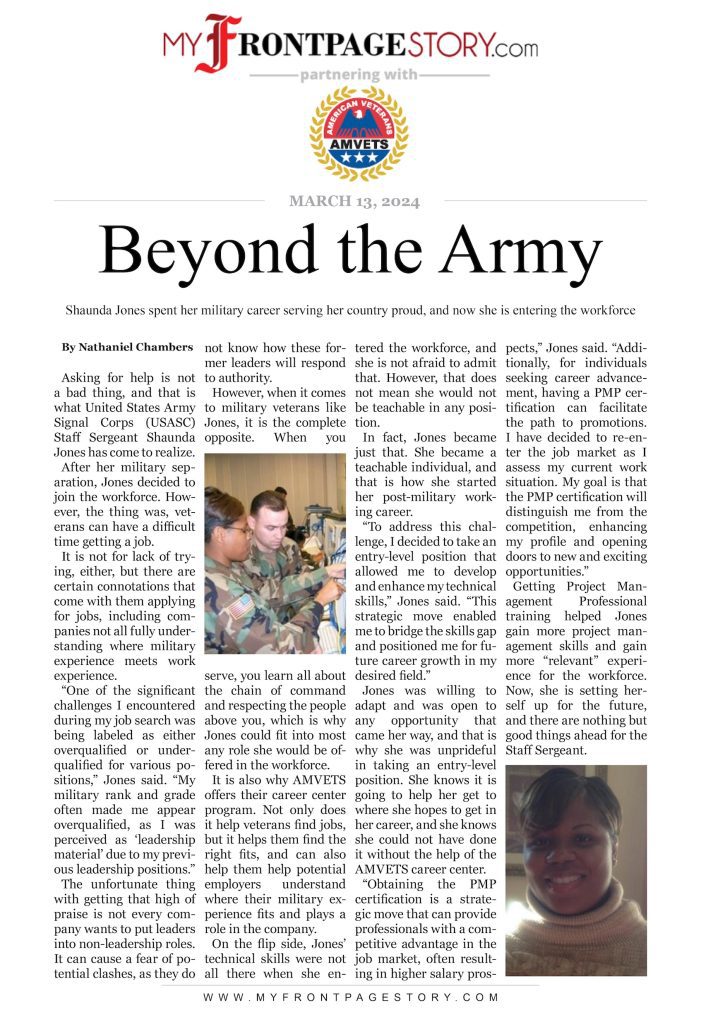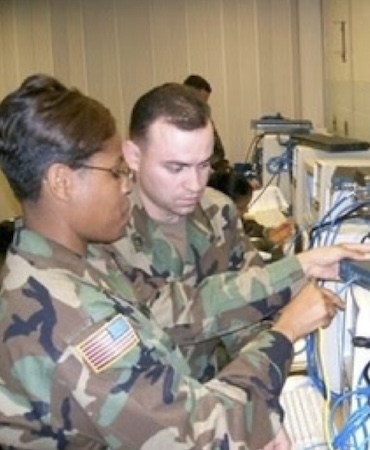
Steady Force: Michelle Hunt is a woman who provides for her family, and her husband and children appreciate her so much
April 1, 2024
“I am in awe of her” – Noelle Nolte
April 2, 2024Beyond the Army: Shaunda Jones spent her military career serving her country proud, and now she is entering the workforce
Asking for help is not a bad thing, and that is what United States Army Signal Corps (USASC) Staff Sergeant Shaunda Jones has come to realize.
After her military separation, Jones decided to join the workforce. However, the thing was, veterans can have a difficult time getting a job.
It is not for lack of trying, either, but there are certain connotations that come with them applying for jobs, including companies not all fully understanding where military experience meets work experience.
“One of the significant challenges I encountered during my job search was being labeled as either overqualified or underqualified for various positions,” Jones said. “My military rank and grade often made me appear overqualified, as I was perceived as ‘leadership material’ due to my previous leadership positions.”
The unfortunate thing with getting that high of praise is not every company wants to put leaders into non-leadership roles. It can cause a fear of potential clashes, as they do not know how these former leaders will respond to authority.
However, when it comes to military veterans like Jones, it is the complete opposite. When you serve, you learn all about the chain of command and respecting the people above you, which is why Jones could fit into most any role she would be offered in the workforce.
It is also why AMVETS offers their career center program. Not only does it help veterans find jobs, but it helps them find the right fits, and can also help them help potential employers understand where their military experience fits and plays a role in the company.
On the flip side, Jones’ technical skills were not all there when she entered the workforce, and she is not afraid to admit that. However, that does not mean she would not be teachable in any position.
In fact, Jones became just that. She became a teachable individual, and that is how she started her post-military working career.
“To address this challenge, I decided to take an entry-level position that allowed me to develop and enhance my technical skills,” Jones said. “This strategic move enabled me to bridge the skills gap and positioned me for future career growth in my desired field.”
Jones was willing to adapt and was open to any opportunity that came her way, and that is why she was unprideful in taking an entry-level position. She knows it is going to help her get to where she hopes to get in her career, and she knows she could not have done it without the help of the AMVETS career center.
“Obtaining the PMP certification is a strategic move that can provide professionals with a competitive advantage in the job market, often resulting in higher salary prospects,” Jones said. “Additionally, for individuals seeking career advancement, having a PMP certification can facilitate the path to promotions. I have decided to re-enter the job market as I assess my current work situation. My goal is that the PMP certification will distinguish me from the competition, enhancing my profile and opening doors to new and exciting opportunities.”
Getting Project Management Professional training helped Jones gain more project management skills and gain more “relevant” experience for the workforce. Now, she is setting herself up for the future, and there are nothing but good things ahead for the Staff Sergeant.





